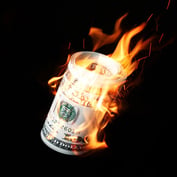(Bloomberg) — Global stocks slipped as signs of resilience in the U.S. labor market and comments from the Bank of England rekindled concern the Federal Reserve will raise interest rates even as China’s slowdown threatens global growth.
U.S. stocks fluctuated as a gain in crude bolstered energy shares. Equities from Asia to Europe slipped on renewed worry a U.S. rate hike as soon as next week would damp growth, while billionaire investor David Tepper raised concern that corporate earnings expectations in America have gotten bloated. A two-day rally in Chinese shares faltered and a downgrade of Brazil’s debt to junk underscored weakness in developing nations.
A rebound in global stocks this week ended in the U.S. on Wednesday after a jobs report bolstered the case for higher rates. Data Thursday added to that sentiment. The Bank of England said turmoil on the global financial markets hasn’t shaken its economic outlook, fueling speculation the Fed may also look past recent turbulence at its policy meeting next week.
“We’ve stopped most of the panic about China collapsing and the world falling apart,” said Ben Kumar, who helps oversee about $14 billion as a money manager at Seven Investment Management in London. “The next question we have to deal with is: Is global growth strong enough to deal with a Fed rate rise?”
In China, comments by Premier Li Keqiang that the country still has “sufficient capability to respond” if growth falls below a reasonable range failed to buttress markets as data showed producer prices fell by the most since 2009.
While economists predict the Fed will increase its key rate next week, futures traders price the odds of an increase at 28 percent, assuming the effective fed funds rate will average 0.375 percent after the first increase.
Equity futures extended declines after billionaire investor David Tepper said he’s not as bullish as he could be about stocks be because of potential problems with earnings growth. In an interview on CNBC, the president of Appaloosa Management LP said that taking a little cash off the table is “not a bad idea.”
Stocks
The Stoxx Europe 600 Index slid 1.3 percent at 9:02 a.m. in New York and the MSCI Asia Pacific Index sank 1.5 percent.
EON SE was Europe’s biggest decliner, dropping 7.5 percent after canceling plans to spin off its German nuclear plants. Wm Morrison Supermarkets Plc retreated 3.4 percent after reporting first-half earnings that missed analysts’ estimates.
Futures on the S&P 500 dropped 0.5 percent. The benchmark gauge is moving more than 1.3 percent almost every day.
Jobless claims fell by 6,000 to 275,000 in the week ended Sept. 5, Labor Department data showed. For the last six months first-time claims have been below the 300,000 level that economists associate with a healthy labor market.
Emerging Markets
The MSCI Emerging Markets Index slid 0.8 percent and the real and Chilean peso led currencies lower. New Zealand’s dollar retreated after a rate cut and the yen fell on speculation the Bank of Japan will ramp up stimulus.
Hong Kong’s Hang Seng China Enterprises Index slipped 2 percent after a two-day, 9.6 percent surge that was the biggest since October 2011. The Shanghai Composite Index retreated 1.4 percent after back-to-back gains that had bolstered optimism the government will be able to engineer a soft landing for the nation’s markets and the wider economy.
After stocks closed the yuan jumped the most on record in Hong Kong’s freely-traded offshore market, spurring speculation China’s central bank intervened to deter bets against its currency.








 September 10, 2015 at 06:47 AM
September 10, 2015 at 06:47 AM










